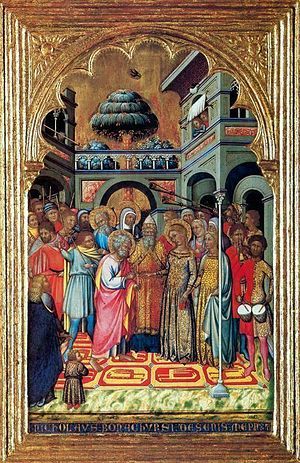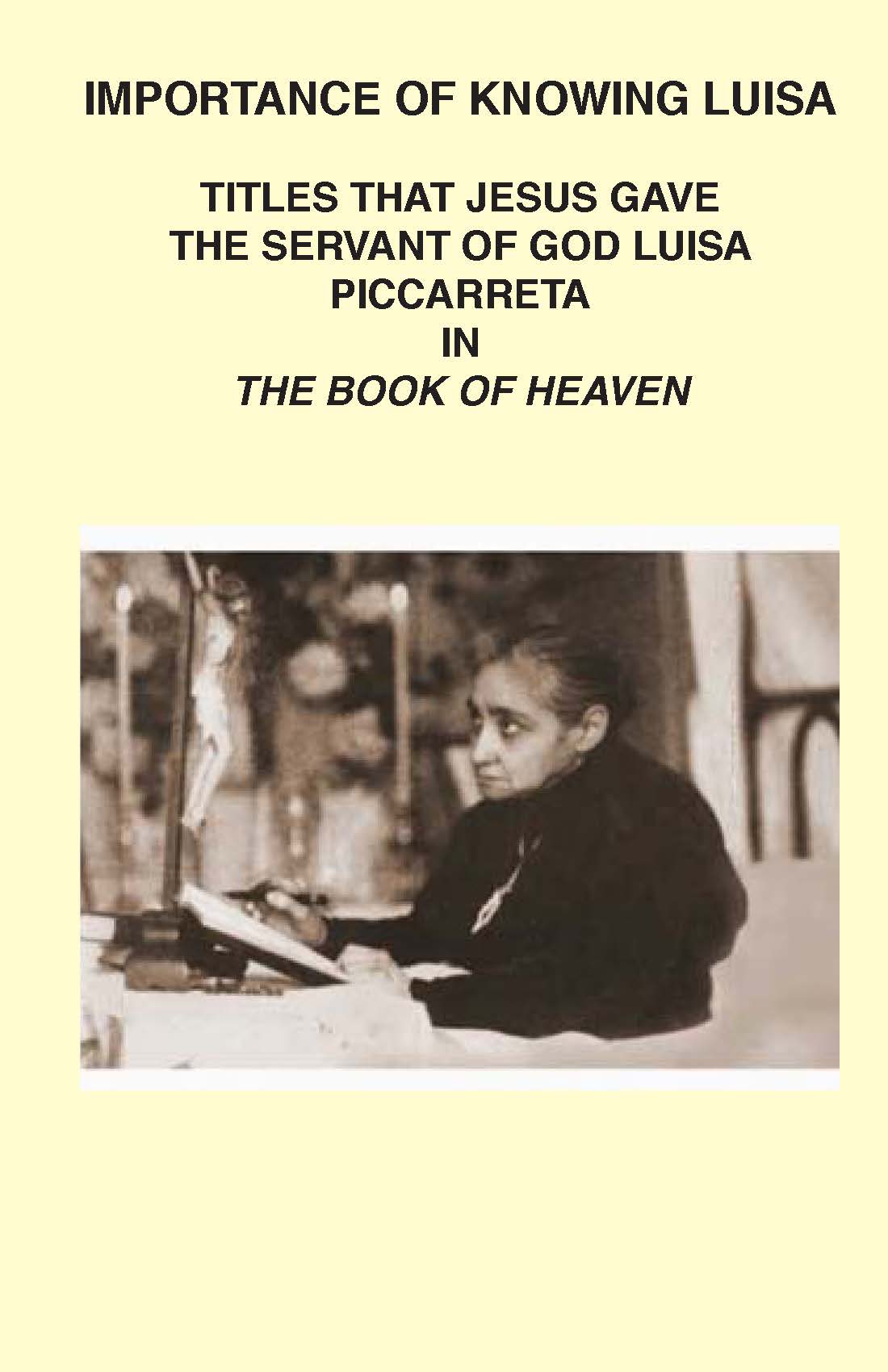 Loading...
Loading...
Permanent link to this article: https://bookofheaven.org/2017/01/27/gospel-reading-for-jan-27-2017-with-divine-will-truths-parables-or-redemption-and-manifestations-of-the-divine-will-truths/
Permanent link to this article: https://bookofheaven.org/2017/01/26/god-is-love-deus-caritas-est-and-the-divine-will/
Permanent link to this article: https://bookofheaven.org/2017/01/26/names-of-god-excellent-rounds/
Jan 26
Feast Day of Saints Timothy and Titus
SAINTS TIMOTHY AND TITUS

On Jan. 26, the Roman Catholic Church celebrates the liturgical memorial of Saints Timothy and Titus, close companions of the Apostle Paul and bishops of the Catholic Church in its earliest days.
Both men received letters from St. Paul, which are included in the New Testament.
Eastern Catholics and Eastern Orthodox Christians also venerate the saints, but do not combine their commemorations. Instead, the Byzantine tradition remembers St. Titus on Aug. 25 and St. Timothy on Jan. 22.
Pope Benedict XVI discussed these early bishops during a general audience on Dec. 13, 2006, noting “their readiness to take on various offices” in “far from easy” circumstances. Both saints, the Pope said, “teach us to serve the Gospel with generosity, realizing that this also entails a service to the Church herself.”
The son of a Jewish mother and a non-Jewish father, Timothy came from Lystra in present-day Turkey. His mother, Eunice, and his grandmother, Lois, are known to have joined the Church, and Timothy himself is described as a student of Sacred Scripture from his youth.
After St. Paul’s visit to Timothy’s home region of Lycaonia, around the year 51, the young man joined the apostle and accompanied him in his travels. After religious strife forced Paul to leave the city of Berea, Timothy remained to help the local church. Paul later sent him to Thessalonica to help the Church during a period of persecution.
The two met up again in Corinth, and Timothy eventually journeyed to Macedonia on Paul’s behalf. Problems in the Corinthian Church brought Timothy back for a time, after which he joined Paul and accompanied the apostle in subsequent travels.
Like Paul, Timothy endured a period of imprisonment in the course of his missionary work. His release is mentioned in the New Testament Epistle to the Hebrews.
Around the year 64, Timothy became the first bishop of the Church of Ephesus. During that same year, he received the first of two surviving letters from St. Paul. The second, written the next year, urges Timothy to visit St. Paul in Rome, where he was imprisoned before his martyrdom.
Ancient sources state that St. Timothy followed his mentor in dying as a martyr for the faith. In the year 93, during his leadership of the Church in Ephesus, he took a stand against the worship of idols and was consequently killed by a mob. The pagan festival he was protesting was held Jan. 22, and this date was preserved as St. Timothy’s memorial in the Christian East.
In contrast with Timothy’s partial Jewish descent and early Biblical studies, St. Titus – who was born into a pagan family – is said to have studied Greek philosophy and poetry in his early years. But he pursued a life of virtue, and purportedly had a prophetic dream that caused him to begin reading the Hebrew Scriptures.
According to tradition, Titus journeyed to Jerusalem and witnessed the preaching of Christ during the Lord’s ministry on earth. Only later, however – after the conversion of St. Paul and the beginning of his ministry – did Titus receive baptism from the apostle, who called the pagan convert his “true child in our common faith.”
St. Paul was not only Titus’ spiritual father, but also depended on his convert as an assistant and interpreter. Titus accompanied Paul to the Apostolic Council of Jerusalem during the year 51, and was later sent to the Corinthian Church on two occasions. After the end of Paul’s first imprisonment in Rome, the apostle ordained Titus as the Bishop of Crete.
Paul sent his only surviving letter to Titus around the year 64, giving instructions in pastoral ministry to his disciple as he prepared to meet up with him in the Greek city of Nicopolis. Titus evangelized the region of Dalmatia in modern Croatia before returning to Crete.
Titus is credited with leading the Church of Crete well into his 90s, overturning paganism and promoting the faith through his prayers and preaching. Unlike St. Timothy, St. Titus was not martyred, but died peacefully in old age.
Permanent link to this article: https://bookofheaven.org/2017/01/26/feast-day-of-saints-timothy-and-titus/
Permanent link to this article: https://bookofheaven.org/2017/01/26/gospel-reading-for-jan-26-2017-with-divine-will-truths-laboring-in-the-field-of-the-soul/
Permanent link to this article: https://bookofheaven.org/2017/01/25/gospel-reading-for-jan-25-2017-with-divine-will-truths-those-who-do-not-believe-remain-empty/
Permanent link to this article: https://bookofheaven.org/2017/01/24/gospel-reading-for-jan-24-2017-with-divine-will-truths-here-are-my-mother-and-brothers/
Jan 23
Espousal of the Blessed Virgin Mary with Saint Joseph
January 23
Espousal of The Blessed Virgin Mary with Saint Joseph

The Espousal of the Blessed Virgin Mary with Saint Joseph
[Historical]
http://www.rosarychurch.net/latin/jan23.html
The Espousal of the Blessed Virgin Mary with Saint Joseph
Hail, holy Mother! giving birth to thy Child, thou didst bring forth the King, who ruleth the heavens and the earth for ever and ever. [Ps.] My heart hath uttered a good word. I speak my works to the King. Glory be to the Father, and to the Son, and to the Holy Ghost. As it was in the beginning, is now, and ever shall be, world without end. Amen. Hail..
COLLECT
Imbue Thy servants, we beseech Thee, O Lord, with the gift of heavenly grace: that having been exhorted to salvation in the childbearing of the Blessed Virgin; in celebrating the solemnity of her espousal we may be granted an increase of peace. Through our Lord.
COLLECT OF SAINT JOSEPH
We beseech Thee, O Lord, that we may be helped by the merits of the Spouse of Thy most holy Mother, so that what we cannot obtain of ourselves may be given to us through his intercession.
Permanent link to this article: https://bookofheaven.org/2017/01/23/espousal-of-the-blessed-virgin-mary-with-saint-joseph/
Permanent link to this article: https://bookofheaven.org/2017/01/23/gospel-reading-for-jan-23-2017-with-divine-will-truths-living-in-a-divided-kingdom/
Permanent link to this article: https://bookofheaven.org/2017/01/22/victory-of-gods-happiness/




















